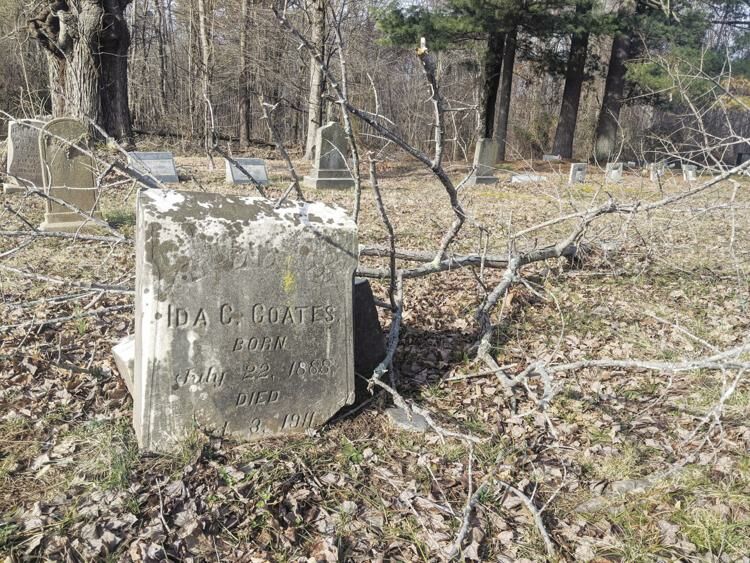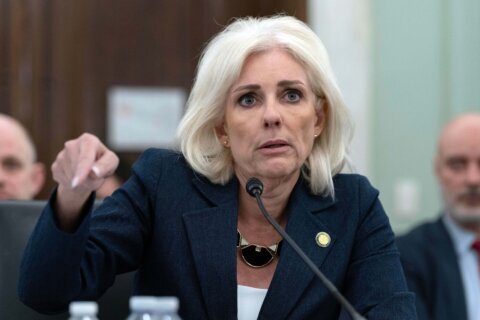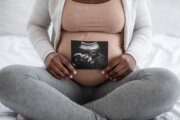This article was republished with permission from WTOP’s news partner InsideNoVa.com. Sign up for InsideNoVa.com’s free email subscription today.

This article was written by WTOP’s news partner, InsideNoVa.com, and republished with permission. Sign up for InsideNoVa.com’s free email subscription today.
To the naked eye, there’s no sign of many of the Mount Pleasant Baptist Church cemetery’s roughly 170 graves, just slight dips and mounds in the terrain behind a fire-damaged church building off Lee Highway in Gainesville.
Deacon Henry Peterson says most of the unmarked plots saw burials in the 1880s; those interred there would have been members of the church or local community.
“We know where they are,” he says, walking through the almost two-acre graveyard.
After the Civil War, a local farm owner went bankrupt and sold the land to African Americans who had worked or been enslaved there. The church was built in 1877 and moved to its current location in 1882. One of the oldest postwar free black settlements in the state grew around it, and the cemetery has been burying its dead ever since. The oldest headstone dates to 1885, when almost all burial grounds in the state were segregated.
Under legislation moving through the Virginia General Assembly, cemeteries like this, where African Americans have been buried since the 1800s, would qualify for the first time for maintenance grants from the state. At $5 a year per headstone for anyone born before 1900, the money wouldn’t come close to what the church spends to maintain the cemetery, but Peterson said it will take anything it can get.
The legislation is half of a two-pronged approach aimed at assisting historic black cemeteries. As part of Gov. Ralph Northam’s “Historic Justice and Equity” initiative, his proposed budget would also dedicate $250,000 toward maintenance of historic African American cemeteries. The state would also hire a historic preservationist focused on historic burial grounds. To help defray the cost, Northam is proposing ending an $83,000 annual allocation to the United Daughters of the Confederacy for upkeep on Confederate graves.
The General Assembly will act on Northam’s budget during its session that ends March 7.
For a long time, the Mount Pleasant Baptist Church handled the land’s upkeep on its own. Another deacon worked regularly with a volunteer and a lawn mower to cut the grass, trim around the headstones and clear any debris. But the deacon is now 92 years old, and about two years ago the church started hiring professional groundskeeping help at a cost of $3,000 a year. Money’s tight, so the church sold the lawn mower to help pay for the upkeep.
The church itself no longer meets at the Lee Highway building. A 2012 fire forced them to move. They’ve been eying a return for the 130 members, but the cost to rebuild has thus far been too much.
The church pulled together enough from a GoFundMe campaign, internal fundraising and insurance money to complete the first phase of the rebuild and get the property’s water infrastructure up to county code, but much of the building still sits without a roof, open to the elements.
There’s also a new expense: rent for the temporary space, and with an aging membership largely relying on fixed incomes, tithes go only so far.
“We’re nowhere close to coming back here. We started the first phase, but that has taken almost all of the money we have,” said Velma Pridemore, a church trustee. “Every night I go to bed; every morning I get up and I pray ‘Lord, give me something to get some money for my church.’”
In that sense, any assistance with cemetery upkeep would help, and Peterson said he was excited to hear about the governor’s proposal. The church hopes its cemetery would qualify, having served a historically significant community dating to the 19th century. Down the line, after the church has been rebuilt, leadership hopes to restore all the headstones that are being overgrown.
Lynn Rainville has spent decades researching historic African American cemeteries. Now the Director of Institutional History at Washington and Lee University, she says the challenges facing Mount Pleasant aren’t uncommon in Virginia.
“As with a lot of church populations, they rise and fall. And especially with out-migration of black families in the 20th century, as families move … they’re leaving behind cemeteries,” Rainville says.
The United Daughters of the Confederacy did not respond to inquiries about the cemetery upkeep work it does in Prince William County or Manassas, but the group has been receiving money from the state to commemorate Confederate dead since 1902. Two years later, it erected the obelisk monument at the Groveton Confederate Cemetery at the Manassas National Battlefield Park.
Rainville believes the governor’s proposal is a recognition that Virginia hasn’t been telling the whole story.
“Just as racism denied people access to fair housing and jobs, racism also affected burial patterns, cemeteries and their preservation,” she said. “This is one of those additive moments … not ‘We should only be spending taxpayer money on one set of the population.’”
For Pridemore, the graves at Mount Pleasant Baptist Church — some belonging to ancestors of current members — represent the land’s significance to the African American community in the area and serve an educational purpose for some of the church’s younger members.
“I want to be a part of preserving our history,” Pridemore said. “You want your sixth, seventh, eighth generations to know where they came from.”







